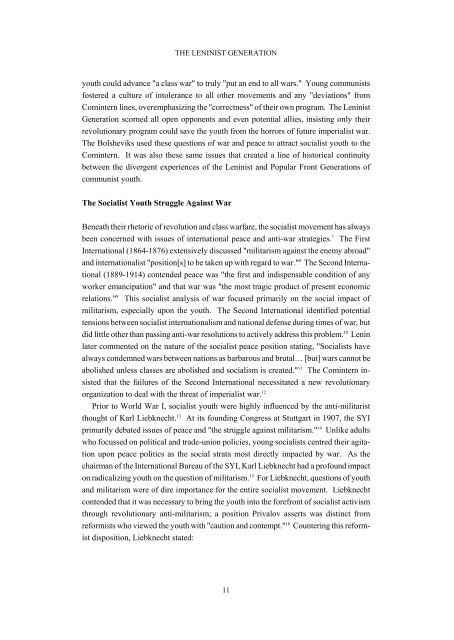Joel A Lewis Youth Against Fascism.pdf
Joel A Lewis Youth Against Fascism.pdf
Joel A Lewis Youth Against Fascism.pdf
You also want an ePaper? Increase the reach of your titles
YUMPU automatically turns print PDFs into web optimized ePapers that Google loves.
THE LENINIST GENERATION<br />
youth could advance "a class war" to truly "put an end to all wars." Young communists<br />
fostered a culture of intolerance to all other movements and any "deviations" from<br />
Comintern lines, overemphasizing the "correctness" of their own program. The Leninist<br />
Generation scorned all open opponents and even potential allies, insisting only their<br />
revolutionary program could save the youth from the horrors of future imperialist war.<br />
The Bolsheviks used these questions of war and peace to attract socialist youth to the<br />
Comintern. It was also these same issues that created a line of historical continuity<br />
between the divergent experiences of the Leninist and Popular Front Generations of<br />
communist youth.<br />
The Socialist <strong>Youth</strong> Struggle <strong>Against</strong> War<br />
Beneath their rhetoric of revolution and class warfare, the socialist movement has always<br />
been concerned with issues of international peace and anti-war strategies. 7 The First<br />
International (1864-1876) extensively discussed "militarism against the enemy abroad"<br />
and internationalist "position[s] to be taken up with regard to war." 8 The Second International<br />
(1889-1914) contended peace was "the first and indispensable condition of any<br />
worker emancipation" and that war was "the most tragic product of present economic<br />
relations." 9 This socialist analysis of war focused primarily on the social impact of<br />
militarism, especially upon the youth. The Second International identified potential<br />
tensions between socialist internationalism and national defense during times of war, but<br />
did little other than passing anti-war resolutions to actively address this problem. 10 Lenin<br />
later commented on the nature of the socialist peace position stating, "Socialists have<br />
always condemned wars between nations as barbarous and brutal… [but] wars cannot be<br />
abolished unless classes are abolished and socialism is created." 11 The Comintern insisted<br />
that the failures of the Second International necessitated a new revolutionary<br />
organization to deal with the threat of imperialist war. 12<br />
Prior to World War I, socialist youth were highly influenced by the anti-militarist<br />
thought of Karl Liebknecht. 13 At its founding Congress at Stuttgart in 1907, the SYI<br />
primarily debated issues of peace and "the struggle against militarism." 14 Unlike adults<br />
who focussed on political and trade-union policies, young socialists centred their agitation<br />
upon peace politics as the social strata most directly impacted by war. As the<br />
chairman of the International Bureau of the SYI, Karl Liebknecht had a profound impact<br />
on radicalizing youth on the question of militarism. 15 For Liebknecht, questions of youth<br />
and militarism were of dire importance for the entire socialist movement. Liebknecht<br />
contended that it was necessary to bring the youth into the forefront of socialist activism<br />
through revolutionary anti-militarism; a position Privalov asserts was distinct from<br />
reformists who viewed the youth with "caution and contempt." 16 Countering this reformist<br />
disposition, Liebknecht stated:<br />
11

















